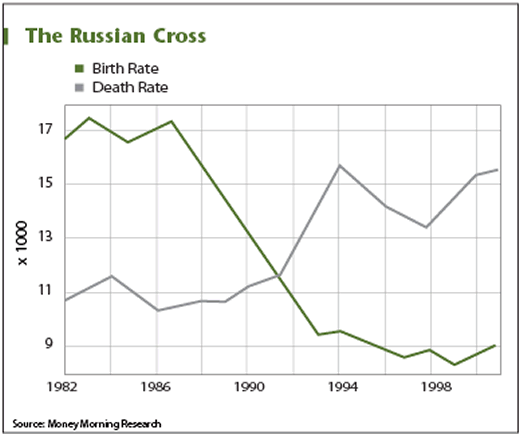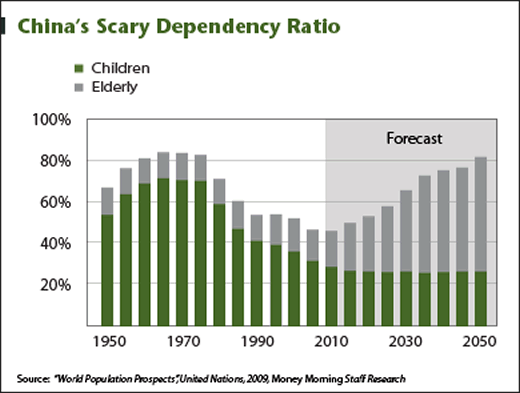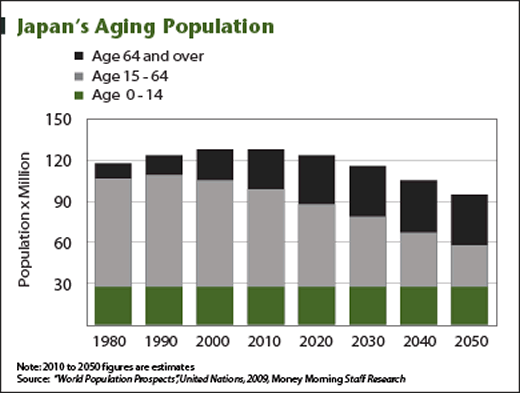Exploding Demographic Time Bombs
Politics / Demographics Jul 02, 2013 - 01:08 PM GMTBy: Money_Morning
 Greg Madison writes: When a big economy hits the shoals, there are options.
Greg Madison writes: When a big economy hits the shoals, there are options.
You can take a Keynesian approach. You can take a Friedmanian approach. There are Bernankes, there are Nodas , the Austrian School, the Chicago School, expansion and contraction - however a government wants to play it, whatever the ideology, there are options and precedents for getting the economy going again.
But there are some problems, some threats that can't be addressed with an easy, take-your-pick policy. These would be the problems posed by simple demographics. Some of the world's biggest economies and most crucial players are facing true demographic crises which, if left untended, will ultimately result in their downfall. These countries are facing demographic time bombs.
The Russian Federation - The sprawling, resource-rich heir to the old Soviet Union is the largest country on Earth by land area. Russia's estimated 143.4 million citizens sparsely dot one-eighth of the Earth's surface. The country is a major nuclear power, re-investing it its military and riding a wave of resource exploitation.

But all the military power and economic growth in the world won't help Russia's fundamental problem. Russia's population hit its peak of 148.7 million people just before the breakup of the Soviet Union. Population there has been on a slow, steady decline ever since.
Death rates, on the other hand, have been rising steadily at the same time. Demographers call this phenomenon the Russian Cross. Fertility rates have plunged, while deaths among males under 50 have exploded, in part due to alcohol and the crumbling healthcare system. It doesn't take much imagination to see the eventual outcome. There are signs that Russia has begun to slow or reverse this ultimately fatal trend, as birth rates increased slightly in 2009, but the pressures facing the country are tremendous.
The People's Republic of China - China's (in)famous "One Child Policy" was introduced in the late 1970s to address growing social, economic, and environmental problems. The policy was to last for one generation, and it's come close to doing just that.
The Chinese government claims that it has prevented 400 million births between 1979 and 2011 - more than the entire population of the United States. The One Child Policy is perhaps the ultimate example of what happens when human efforts run headlong into a force of nature. A whole host of well-publicized, lurid ills has followed.
For millennia, Chinese society has focused on the family; family size, family stability. A couple who had plentiful children could count on those children to support them in their old age, generate income for the family, and ultimately grow and assure the family's success and prosperity.

The One Child Policy is not applied equally throughout Chinese society. Some 35.9% of the population is subject to strict limit, 52.9% of the population is allowed to have more than one child - if their first was a daughter, and 1.6% is not subject to any limit at all.
If a family is wealthy enough, they may have as many children as is practical for their circumstances and simply pay the large fines associated with flouting the law. The bottom line for China is that the One-Child Generation will soon have to provide for massive numbers of its aging parents, and this generation will not be able to draw on its traditional sibling support structure.
The picture is an inverted, massively top heavy pyramid. As daunting as this prospect is, it's made even worse by the massive gender imbalance developing in the country. Males outnumber females by nearly 10 million, as a traditional preference for boys takes on a frightening, modern dimension. In a way, the One Child Policy forces couples to choose between any hope of a comfortable retirement and their daughters' lives.
The State of Israel - Israel is facing a unique demographic time bomb, perhaps the only country to experience such a quandary. The problem derives from Israel's stated wish, laid out in its founding documents and philosophy: to be a liberal democracy with an essentially Jewish character.

At a point in the not too distant future, Israel will realize that it actually cannot be both. The problem is one of population, population growth, ethnicity, and mutual antagonism. This is a region in conflict in which so very much depends on ethno-religious identity.
However you come down on the Israel/Palestinian conflict, the numbers are inescapable - a simple matter of birthrates: By the year 2020, there will be more people living under Israeli occupation or military administration than in Israel proper. By 2020, the Jewish population of Israel will reach roughly 6.9 million people, while the Palestinian population in Israel and, crucially, the West Bank and Gaza, will reach 7.2 million.
The disparity becomes greater the farther out in time one looks. The question for Israel then becomes one of choice: either a Jewish state or a democracy. With conditions strictly as they are now, it cannot be both. The challenge facing Israelis and Palestinians is to come to some sort of mutually agreeable, workable solution before these pressures become too overwhelming to allow for any kind of peaceful solution.
Japan - Japan faces a rapidly aging population, troublesome unemployment, and declining birthrates - as most of the "developed world" does. Japan has a highly advanced economy and one of the world's longest life expectancies at just over 81 years.
But Japan is shrinking. It faces a double whammy of falling birth rates and negligible net immigration. Japanese society has never been particularly welcoming of immigrants and the "fresh blood" they can provide. Japan's own health ministry estimates that the country will lose 1 million people each year in the coming decades until, in 2080, it will have 87 million citizens - more than 40% of whom will be over the age of 65.

There will be unbearable pressure on young workers to provide for the aging population. And these "supporting" workers will most assuredly not have the same job stability as previous generations of Japanese have enjoyed. That is becoming evident even now.
This aging population will tend to want to take advantage of an advanced, pervasive social security regime in place since the 1920s and expanded in the post-World War II era. Supporting generations of workers will have to come up with close to four times the amount that previous generations contributed to the public pot.
Japan is a society which traditionally respects the obligation of the young to the old. But as the population ages and very real burdens fall on the shoulders of younger workers, can it be very long until this respect turns into resentment and this aspect of Japanese culture is lost or changed forever?
Source :http://moneymorning.com/2013/07/01/big-problems-these-countries-are-facing-demographic-time-bombs/
Money Morning/The Money Map Report
©2013 Monument Street Publishing. All Rights Reserved. Protected by copyright laws of the United States and international treaties. Any reproduction, copying, or redistribution (electronic or otherwise, including on the world wide web), of content from this website, in whole or in part, is strictly prohibited without the express written permission of Monument Street Publishing. 105 West Monument Street, Baltimore MD 21201, Email: customerservice@moneymorning.com
Disclaimer: Nothing published by Money Morning should be considered personalized investment advice. Although our employees may answer your general customer service questions, they are not licensed under securities laws to address your particular investment situation. No communication by our employees to you should be deemed as personalized investent advice. We expressly forbid our writers from having a financial interest in any security recommended to our readers. All of our employees and agents must wait 24 hours after on-line publication, or after the mailing of printed-only publication prior to following an initial recommendation. Any investments recommended by Money Morning should be made only after consulting with your investment advisor and only after reviewing the prospectus or financial statements of the company.
Money Morning Archive |
© 2005-2022 http://www.MarketOracle.co.uk - The Market Oracle is a FREE Daily Financial Markets Analysis & Forecasting online publication.



